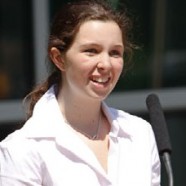
When I first stepped onto the Milton Academy campus in the fall of 2007, I thought I knew exactly the trajectory my high school career would take. And just as I had a vivid picture of where I would sit in Forbes, and what I would wear to my fi rst school dance, I entertained romanticized visions of myself in the science lab. Long white coat and gloves, in case whatever extremely dangerous substance I was studying should stray from the test tube in my steady and capable hands. I thought I knew what it meant to study science, and I knew that was what I wanted to do. Four years later, and almost on the other side of my Milton career, I find that I was only partially correct. I still yearn to study and learn about science. Four years ago, however, I had no idea what that meant.
During my Class III year, I enrolled in an Honors Chemistry class that I was, admittedly, unprepared for. Suffice it to say, and as Ms. Samson can attest, I did not do very well. After my abysmal performance in that class, I was sure that I wasn’t good at science, and that I would never take another high-level science class at Milton. I was wrong. With the support of the department, I somehow found myself sitting in Dr. Eyster’s Honors Biology class on the first day of my Class II year, petrified because I had heard that she was “the toughest grader ever.” I thought I would fail, and potentially drop the class within the first week. I was wrong again. Not only did I not fail, but I learned to succeed. Dr. Eyster managed to cultivate in me a deep passion for biology and the scientific process. She changed the way I think about academics and science; she taught me how to ask hard questions and then work for answers; she brought me to engage in independent thought regardless of what has been previously accepted. As a result of that biology class and the encouragement I received, I developed a deep passion for the study of science, and a genuine interest in the sciences. I have learned the skills I will need to satisfy that interest and apply that passion outside of Milton.
Now, I’m just one voice. This is one student’s experience. But it is telling and, in my opinion, revelatory, about the nature of science at Milton Academy. This is not a place that sticks to textbooks, or traps its students behind desks. Instead, our teachers like to attach fire extinguishers to go-karts, or dissect formaldehyde soaked squids to teach their principles. Milton is not a place that feels it is necessary to teach one principle or theory in order to give students the correct answers for an exam. Instead, we learn that science is multifaceted, and ever-changing, with what is “right” being disproved all the time. Milton is not a place that lectures, dissuades, weeds out or discourages. Instead, it is a place that, four years ago, took a chance on this struggling student, and helped me reach my highest potential.
Isabelle Lelogeais ’11 delivered these remarks to students, faculty, staff, trustees and alumni on May 6, 2011, at the dedication of the Pritzker Science Center. Isabelle pursues her study of science at Rice University this fall.



